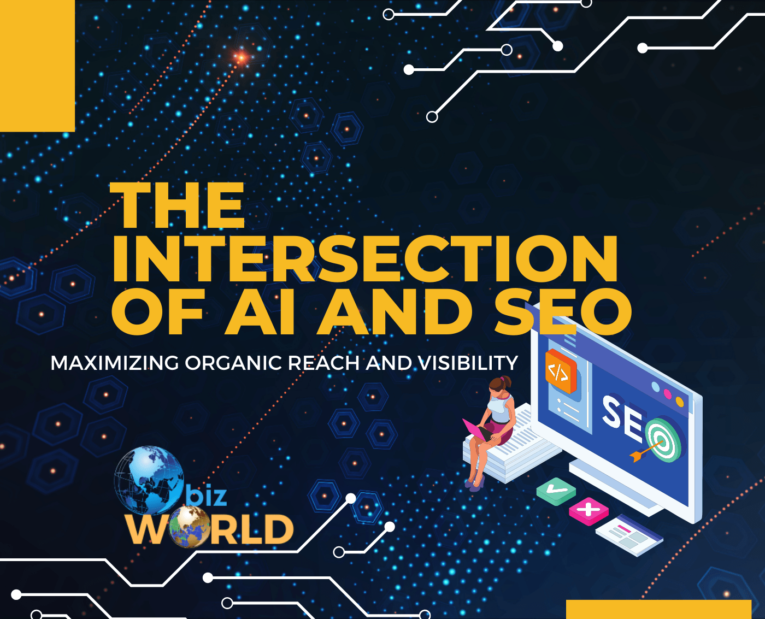The digital landscape is constantly evolving, and two of the most prominent forces driving change are artificial intelligence (AI) and search engine optimization (SEO). AI, with its ability to mimic human intelligence, has found its way into various fields, including SEO, transforming the way websites are ranked and optimized for organic reach and visibility. In this article, we will explore the intersection of AI and SEO, highlighting how businesses can leverage AI to maximize their online presence and stay ahead in the competitive digital landscape.

Table of Contents
- I. Introduction
- II. The Role of AI in SEO
- III. Leveraging AI for Keyword Research
- IV. Content Creation and Optimization with AI
- V. AI for On-Page Optimization
- VI. AI and Link Building
- VII. AI for Rank Tracking and Monitoring
- VIII. Voice Search and AI in SEO
- IX. AI and Local SEO
- X. Mobile Optimization with AI
- XI. AI and User Experience (UX)
- XII. Future Trends and Challenges
- XIII. Conclusion
- Frequently Asked Questions (FAQs)
I. Introduction
A. Definition of AI and SEO
Before delving into the relationship between AI and SEO, let’s briefly define these terms. Artificial intelligence refers to the development of computer systems capable of performing tasks that typically require human intelligence, such as problem-solving, decision-making, and learning from data. On the other hand, search engine optimization is the practice of optimizing a website’s content, structure, and other factors to rank higher in search engine results pages (SERPs) and attract organic traffic.
B. Importance of Organic Reach and Visibility
Achieving a high organic reach and visibility is crucial for businesses operating in the digital realm. When users search for products, services, or information, they rely heavily on search engines like Google to provide them with relevant results. Appearing prominently in these search results can lead to increased website traffic, brand exposure, and ultimately, more conversions and revenue. By understanding the intersection of AI and SEO, businesses can unlock new opportunities to enhance their online presence.
II. The Role of AI in SEO
AI has revolutionized the way search engines operate, impacting how websites are ranked and optimized. Search engine algorithms are becoming increasingly sophisticated, thanks to AI-powered systems that can analyze vast amounts of data and deliver more accurate and relevant search results. Let’s explore the role of AI in SEO in more detail.
A. AI-powered Search Engines
Leading search engines like Google employ AI algorithms to analyze user queries and deliver the most relevant results. These algorithms take into account a wide range of factors, including the user’s location, search history, and preferences. By leveraging AI, search engines can better understand user intent and provide personalized and contextually relevant search results.
B. AI Algorithms and Ranking Factors
AI algorithms play a crucial role in determining website rankings. Factors such as relevance, user experience, backlink quality, and website performance are taken into account by AI-powered algorithms to assess a website’s authority and credibility. Websites that align with these ranking factors have a higher chance of appearing on the first page of search results.
C. Natural Language Processing and Semantic Search
AI-powered search engines utilize natural language processing (NLP) techniques to understand the meaning behind search queries and web content. This enables search engines to go beyond keyword matching and understand the context and intent of user queries. Semantic search, a concept closely related to NLP, focuses on interpreting the user’s search intent and delivering results that best match that intent.
III. Leveraging AI for Keyword Research
Keywords are the foundation of SEO, and AI can greatly assist in keyword research and optimization efforts. Let’s explore how businesses can leverage AI for effective keyword research.
A. Automated Keyword Discovery Tools
AI-powered tools can automate the process of keyword discovery by analyzing search trends, user behavior, and competitor data. These tools can provide valuable insights into high-traffic keywords, long-tail keyword opportunities, and user intent. By using AI-driven keyword research tools, businesses can identify relevant keywords that align with their target audience’s search queries.
B. Analyzing Search Intent with AI
Understanding search intent is essential for creating content that satisfies user needs. AI algorithms can analyze search queries and identify the underlying intent, whether it’s informational, navigational, transactional, or local. By aligning content with the user’s search intent, businesses can create more relevant and valuable content that is likely to rank higher in search results.
C. Long-tail Keyword Optimization
Long-tail keywords are specific, longer phrases that typically have lower search volume but higher conversion potential. AI-powered tools can help identify and optimize for long-tail keywords, as they can analyze user behavior and search patterns to uncover these valuable keyword opportunities. By incorporating long-tail keywords strategically into their content, businesses can target niche audiences and attract highly relevant traffic.
IV. Content Creation and Optimization with AI


Content creation and optimization are vital aspects of SEO, and AI can significantly streamline these processes. Let’s explore how businesses can leverage AI for content creation and optimization.
A. AI-generated Content
AI-powered content generation tools have gained popularity in recent years. These tools use machine learning algorithms to analyze vast amounts of data and generate human-like content. While AI-generated content can be a valuable resource for generating ideas and drafts, it’s crucial to maintain a human touch and ensure that the content is tailored to the target audience’s needs.
B. Content Optimization using AI Tools
AI can also assist in optimizing existing content to improve its relevance and visibility. AI-powered tools can analyze content structure, readability, keyword density, and other factors that influence search engine rankings. By leveraging these tools, businesses can identify areas for improvement and optimize their content for better search engine visibility.
C. Enhancing User Experience with AI
User experience (UX) plays a vital role in SEO, and AI can help businesses enhance their website’s UX
V. AI for On-Page Optimization
To further enhance the optimization process, AI can be utilized for on-page optimization. Let’s explore the ways in which AI can aid in improving on-page elements for better search engine visibility.
A. AI-powered Content Analysis
AI-powered tools can analyze the content on web pages and provide valuable insights to improve its quality and relevance. These tools can evaluate factors such as readability, keyword density, sentence structure, and overall content structure. By utilizing AI for content analysis, businesses can ensure that their web pages are optimized for both search engines and users.
B. Automated Meta Tag Optimization
Meta tags, including meta titles and descriptions, play a crucial role in conveying relevant information to search engines and users. AI algorithms can automatically analyze web page content and generate optimized meta tags that align with the page’s content and target keywords. By leveraging AI for meta-tag optimization, businesses can improve click-through rates and attract more organic traffic.
C. Structured Data Markup and Schema
Structured data markup, in the form of schema.org tags, provides search engines with additional context about web page content. AI can assist in generating and implementing structured data markup, allowing search engines to understand the information on web pages more effectively. This can result in enhanced search engine visibility through rich snippets, knowledge panels, and other enhanced search features.
VI. AI and Link Building
Link building remains a crucial aspect of SEO, and AI can play a significant role in streamlining the link-building process. Let’s explore how AI can aid businesses in building high-quality backlinks.
A. Identifying High-Quality Backlink Opportunities
AI-powered tools can analyze various factors, such as domain authority, relevance, and backlink profiles of websites, to identify high-quality backlink opportunities. By leveraging AI, businesses can save time and effort in identifying authoritative websites for potential collaborations and link placements.
B. Predictive Link Building with AI
AI algorithms can predict the success of link-building campaigns by analyzing historical data and patterns. These algorithms can identify link-building strategies that are likely to yield positive results and help businesses make informed decisions regarding their link-building efforts. By utilizing predictive link building with AI, businesses can improve the effectiveness of their campaigns and maximize their organic reach.
C. Analyzing Competitor Link Profiles
AI-powered tools can analyze competitor link profiles to identify potential backlink opportunities that can help businesses gain a competitive edge. By understanding the link-building strategies of competitors, businesses can devise their own strategies to acquire high-quality backlinks and improve their search engine rankings.
VII. AI for Rank Tracking and Monitoring
Tracking and monitoring website rankings is essential to gauge the effectiveness of SEO efforts. AI can streamline this process by providing automated rank tracking and advanced performance analysis.
A. Automated Rank Tracking Tools
AI-powered rank-tracking tools can monitor website rankings on search engine results pages. These tools can provide accurate and up-to-date ranking data, eliminating the need for manual tracking and allowing businesses to identify trends and make data-driven decisions for optimization.
B. AI-based Performance Analysis
AI algorithms can analyze various performance metrics, such as website traffic, bounce rate, and user engagement, to provide insights into the effectiveness of SEO strategies. By leveraging AI-based performance analysis, businesses can identify areas of improvement and optimize their websites for better user experience and search engine visibility.
C. Monitoring Brand Mentions and Sentiment Analysis
AI can assist in monitoring brand mentions across various online platforms and social media channels. By analyzing sentiment and user interactions, businesses can gain valuable insights into their brand reputation and make necessary adjustments to their SEO and marketing strategies.
VIII. Voice Search and AI in SEO
The rise of voice search has transformed the way users interact with search engines, and AI plays a crucial role in optimizing for voice search. Let’s explore how businesses can leverage AI to optimize their content for voice search.
A. Growing Importance of Voice Search
Voice search has gained significant popularity with the rise of virtual assistants and smart devices. Users are increasingly relying on voice commands to search for information, perform tasks, and make inquiries. It’s crucial for businesses to adapt their SEO strategies to accommodate voice search queries and provide relevant answers.
B. Optimizing for Voice Search using AI
AI-powered tools can help businesses optimize their content for voice search by identifying and analyzing voice search queries and patterns. By understanding the nuances of voice-based queries, businesses can tailor their content to provide concise, conversational answers that are more likely to be featured as voice search results.
C. Featured Snippets and Voice Assistants
Featured snippets, also known as position zero, are concise snippets of information that appear at the top of search results. AI algorithms play a significant role in selecting and presenting these snippets. By optimizing content to appear as featured snippets, businesses can increase their chances of being selected as the voice assistant’s response to voice queries.
IX. AI and Local SEO
Local SEO focuses on optimizing websites for location-based searches, and AI can be a valuable asset in this process. Let’s explore how businesses can leverage AI for local SEO.
A. Location-based Targeting with AI
AI algorithms can analyze user location data and provide businesses with insights into their target audience’s geographical preferences. By leveraging this data, businesses can optimize their content and targeting strategies to reach the right audience in specific locations.
B. Personalization and Geolocation
AI can assist in delivering personalized content based on user geolocation. By providing location-specific information and offers, businesses can enhance the user experience and increase their chances of attracting local customers.
C. AI-driven Local Search Ranking Factors
AI algorithms consider various factors, such as online reviews, directory listings, and local citations, to determine local search rankings. By utilizing AI-driven analysis, businesses can identify areas for improvement in their local SEO efforts and implement strategies to enhance their visibility in local search results.
X. Mobile Optimization with AI
With the increasing usage of mobile devices, optimizing websites for mobile users has become crucial. AI can play a significant role in mobile optimization. Let’s explore how businesses can leverage AI for mobile optimization.
A. Mobile-first Indexing and AI
Search engines are increasingly prioritizing mobile-first indexing, where the mobile version of a website is given priority in search rankings. AI algorithms can analyze websites for mobile compatibility, responsiveness, and user experience, ensuring that businesses optimize their websites for mobile-first indexing.
B. AI-powered Mobile User Experience
AI can analyze user behavior and interaction patterns on mobile devices to provide businesses with insights into optimizing their mobile user experience. By leveraging AI, businesses can create intuitive navigation, faster loading times, and personalized mobile experiences that cater to the needs and preferences of mobile users.
C. Accelerated Mobile Pages (AMP) and AI
Accelerated Mobile Pages (AMP) is an open-source framework designed to improve website performance on mobile devices. AI can assist in optimizing websites for AMP, ensuring fast-loading pages and improved user experience. By implementing AI-driven AMP optimization, businesses can enhance their mobile visibility and engage users effectively.
XI. AI and User Experience (UX)
AI has the potential to significantly enhance user experience (UX) by providing personalized and interactive elements on websites. Let’s explore how businesses can leverage AI to improve user experience.
A. Personalization and AI
AI algorithms can analyze user data, such as browsing behavior, preferences, and past interactions, to deliver personalized content and recommendations. By leveraging AI-powered personalization, businesses can create tailored user experiences that resonate with individual users, leading to increased engagement, satisfaction, and conversions.
B. Chatbots and Virtual Assistants
AI-powered chatbots and virtual assistants have become increasingly common in customer support and engagement. These AI-driven conversational agents can provide instant responses, answer frequently asked questions, and assist users in navigating websites. By integrating chatbots and virtual assistants, businesses can enhance the user experience by providing immediate assistance and personalized recommendations.
C. AI for User Behavior Analysis
AI can analyze user behavior patterns, such as click-through rates, time spent on pages, and conversion rates, to gain insights into user preferences and pain points. By understanding user behavior, businesses can optimize their websites, improve navigation, and offer targeted content to enhance the overall user experience.
XII. Future Trends and Challenges
As AI continues to evolve, new trends and challenges emerge at the intersection of AI and SEO. Let’s explore some future trends and challenges that businesses should be aware of.
A. Advancements in AI and SEO
The field of AI is constantly advancing, and this has a direct impact on SEO. As AI algorithms become more sophisticated, search engines will continue to refine their ranking factors and algorithms. Businesses need to stay updated with these advancements to adapt their SEO strategies accordingly.
B. Ethical Considerations of AI in SEO
As AI plays a more prominent role in SEO, ethical considerations come into play. Issues such as bias in AI algorithms, user privacy, and transparency in data usage need to be addressed. It is crucial for businesses to ensure that AI-powered SEO practices are ethical and prioritize user trust and data protection.
C. Balancing Automation with Human Touch
While AI can automate various aspects of SEO, it is important to strike a balance between automation and maintaining a human touch. User engagement, creativity, and personalized experiences still require human input. Businesses need to find the right balance between leveraging AI technology and maintaining the human element in their SEO strategies.
XIII. Conclusion
The intersection of AI and SEO presents immense opportunities for businesses to maximize their organic reach and visibility. By leveraging AI-powered tools and techniques, businesses can streamline their SEO efforts, from keyword research and content optimization to on-page optimization and link building. AI’s impact on voice search, local SEO, mobile optimization, and user experience cannot be underestimated. However, as AI continues to evolve, it is essential for businesses to stay updated with the latest trends, address ethical considerations, and maintain a human touch in their SEO strategies.
With AI as a powerful ally, businesses can unlock new levels of optimization, engage with their target audience more effectively, and ultimately drive organic traffic and conversions. Embracing the intersection of AI and SEO will empower businesses to navigate the ever-changing digital landscape with confidence and stay ahead of the competition.
Frequently Asked Questions (FAQs)
1. How does AI affect SEO rankings? AI algorithms play a significant role in determining website rankings by analyzing various factors such as relevance, user experience, and backlink quality. AI-powered search engines can understand user intent better and provide more accurate and personalized search results, impacting SEO rankings [2][4].
2. Can AI help with local SEO optimization? Absolutely! AI can assist in location-based targeting, personalization, and analyzing local search ranking factors, helping businesses optimize their local SEO efforts and reach their target audience in specific locations.
3. How can AI improve user experience on websites? AI can enhance user experience through personalization, chatbots, virtual assistants, and user behavior analysis. By analyzing user data, AI algorithms can deliver personalized content and recommendations, provide instant assistance through chatbots, and optimize websites based on user behavior patterns.
4. What are the challenges of incorporating AI in SEO? Some challenges include staying updated with AI advancements, addressing ethical considerations, and finding the right balance between automation and maintaining a human touch. Businesses need to navigate these challenges to ensure ethical, effective, and user-centric AI-powered SEO practices.
5. How can businesses optimize their websites for voice search using AI? By leveraging AI tools, businesses can analyze voice search queries, optimize content to match voice search intent, and aim to appear as featured snippets. This can increase their chances of being selected as the voice assistant’s response to voice queries and enhance their visibility in voice search results.
Remember, AI and SEO continue to evolve, so it’s essential for businesses to adapt and embrace new strategies to maximize their organic reach and visibility in the ever-changing digital landscape.


Hello my loved one I want to say that this post is amazing great written and include almost all significant infos I would like to look extra posts like this
Very interesting topic, appreciate it for posting.Raise your business